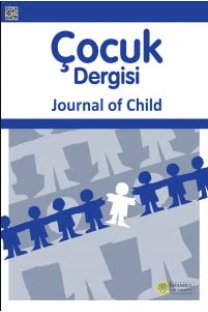Prematüre bebekleri yenidoğan yoğun bakım ünitesinde yatan ebeveynlerde ortaya çıkan stresörler
Süt çocuğu, prematür, Konu ile ilgili görüşmeler, Stres, psikolojik, Ebeveynler, Yoğun bakım üniteleri, yenidoğan
Stressors parents’ of premature newborns hospitalized in a neonatal intensive care unit
Infant, Premature, Interviews as Topic, Stress, Psychological, Parents, Intensive Care Units, Neonatal,
___
- 1. Bibby E, Stewart A. The epidemiology of preterm birth. Neuro Endocrinol Lett 2004; 25(Suppl 1):43-7.
- 2. Türk Neonataloji Derneği Çok Merkezli Çalışma Grubu.Türkiye’de perinatal mortalite-1999,Türk Neonataloji Derneği Bülteni 2001; 2:8-12.
- 3. Miles MS, Funk SG, Kasper MA. The neonatal intensive care unit environment: sources of stress for parents. AACN Clin Issues Crit Care Nurs 1991; 2:346-54.
- 4. LaMontagne LL, Hepworth JT, Pawlak R, Chiafery M. Parental coping and activities during pediatric critical care. Am J Crit Care 1992; 1:76-80.
- 5. Jamsa K, Jamsa T. Technology in neonatal intensive care-a study on parents’experiences. Technol Health Care 1998; 6:225-30.
- 6. Holditch-Davis D, Miles MS. Mothers’stories about their experiences in the neonatal intensive care unit. Neonatal Netw 2000; 19:13-21.
- 7. Cunha ML. Hospitalized newborn infant: The Parents’ experience. Rev Gaucha Enferm 2000; 21(Suppl):70-83.
- 8. Fegran L, Helseth S, Fagermoen MS. A comparison of mothers’ and fathers’ experiences of the attachment process in a neonatal intensive care unit. J Clin Nurs 2008; 17:810-6.
- 9. Heuer L. Parental stressors in a pediatric intensive care unit. Pediatr Nurs 1993; 19:128-31.
- 10. Hughes M, McCollum J, Sheftel D, Sanchez G. How parents cope with the experience of neonatal intensive care. Child Health Care 1994; 23:1-14.
- 11. Hill YW. Children in intensive care:can nurse-parent partnership enable the child and family to cope more effectively. Intensive Crit Care Nurs 1996; 12:155-60.
- 12. Pearlin LI, Schieman S, Fazio EM, Meersman SC. Stress, health, and the life course: some conceptual perspectives. J Health Soc Behav 2005; 46:205-19.
- 13. Billings JR. Bonding theory -tying mothers in knots? A critical review of the application of a theory to nursing. J Clin Nurs 1995; 4:207-11.
- 14. Anderson AM. The father-infant relationship: becoming connected. J Soc Pediatr Nurs 1996; 1:83-92.
- 15. Goulet C, Bell L, Tribble DS, Paul D, Lang A. A concept analysis of parent-infant attachment. J Adv Nurs 1998; 28:1071-81.
- 16. Lau R, Morse C. Experiences of parents with premature infants hospitalized in neonatal intensive care units: a literature review. J Neonatal Nurs 1998; 4:23-9.
- 17. Schor EL. Family pediatrics: report of the task force on the family. Pediatrics 2003; 111:1541-71.
- 18. Kvale S. Interviews: an introduction to qualitative research interviewing. Sage, Thousand Oaks, CA, 1996.
- 19. Shellabarger SG, Thompson TL. The critical times: meeting parental communication needs throughout the NICU experience. Neonatal Netw 1993; 12:39-45.
- 20. Whaley L, Wong D. Nursing Care of Infants and Children. 6th. ed. Oxford, Oxford University Press, 1999.
- 21. Miles MS,Wilson SM,Docherty SL. African American mothers’ responses to hospitalization of an infant with serious health problems. Neonatal Netw 1999; 18:17-25
- 22. Lawhon G. Facilitation of parenting the premature infant within the newborn intensive care unit. J Perinat Neonatal Nurs 2002; 16:71-82.
- 23. Zoet GJ, Calff MM, Garssen BJ, Bijmer RP, Schidwacht T. Parents’ Experiences in a pediatric intensive care unit. Tijdschr Kindergeneeskd 1993; 61:199-205.
- 24. Sydnor-Greenberg N, Dokken D. Coping and caring in different ways: Understanding and meaninful involvement. Pediatr Nurs 2000; 26:185-90.
- 25. Gloppestad K. Initial separation time between fathers and their premature infants: comparison between two periods of time. Vard Norden 1995; 15:10-7.
- 26. Sullivan JR. Development of father-infant attachment in fathers of preterm infants. Neonatal Netw 1999; 18:33-9.
- 27. Curley MA, Wallace J. Effects of the nursing mutual participation model of care on parental stress in the pediatric intensive care unit--a replication. J Pediatr Nurs 1992; 7:377-85.
- 28. Beal JA, Quinn M. The nurse practitioner role in the NICU as perveived by parents. MCN Am J Matern Child Nurs 2002; 27:183-8.
- 29. Noyes J. A critique of studies exploring the experiences and needs of parents of chilren admittitted to paediatric intensive care units. J Adv Nur 1998; 28:134-41.
- 30. Miles MS, Carlson J, Funk SG. Sources of support reported by mothers and fathers of infants hospitalized in a neonatal intensive care unit. Neonatal Netw 1996; 15:45-52.
- 31. Jones F. Culturel influences. In: ME Broome&JA Rollins (Eds.), Core Curriculum for the nursing care of children and their families, 1999: 393-409.
- 32. Prudhoe CM, Peters DL. Social support of parents and grandparents in the neonatal intensive care unit. Pediatr Nurs 1995; 21:140-6.
- 33. Ren XS, Skinner K, Lee A, Kazis L. Social support, social selection and self-assessed health status: results from the veterans health study in the United States. Soc Sci Med 1999; 48:1721-34.
- ISSN: 1302-9940
- Yayın Aralığı: Yılda 4 Sayı
- Başlangıç: 2000
- Yayıncı: İstanbul Üniversitesi
Prematüre bebekleri yenidoğan yoğun bakım ünitesinde yatan ebeveynlerde ortaya çıkan stresörler
Hotun Nevin ŞAHİN, ÜMRAN OSKAY
Preterm doğan çocuklarda prepubertal dönemde insülin direncinin değerlendirilmesi
FATMA FEYZA DARENDELİLER, FİRDEVS BAŞ, Rüveyde BUNDAK, EMİNE ASUMAN ÇOBAN, Nilay BAŞ, ÖZLEM SANCAKLI, Kabataş Sema ERYILMAZ, Banu KÜÇÜKEMRE, Rian DİŞÇİ, Gülbin GÖKÇAY, Semih AKI, Zeynep İNCE, Nurten ESKİYURT
Konjenital miyotoni: Becker varyantı olan bir vaka sunumu
Aycan ÜNALP, Saniye GÜLLE, Demet CAN, Mustafa BAK
Yoğun bakım dışında mekanik ventilasyon uygulamaları
Perran BORAN, Gülnur TOKUÇ, Pınar UYGUR
Topallama ve idrar kaçırma yakınması olan çocuk hasta
Tuğrul Melike Zeynep AKSAKAL, Esra DEVECİOĞLU, Burak TATLI, Ayşe KILIÇ
Dünyada ve Türkiye’de yoksulluk/eşitsizlik ve çocuklar
Fatih YAĞMUR, Didem Behice ÖZTOP, Haşim ASİL
Levent ELEMEN, Günbey Gökçe BASLO, Kıray Evrim BAŞ, Feriha ÖZ, Ergun ERDOĞAN
Tekrarlayan salmonella subgrup 1 septisemisi: Vaka sunumu
İnci ARIKAN, Nergiz BATTALOĞLU, Şeyda BEŞEN, Yıldız DALLAR
Çocuk acil servisine başvuran vakaların değerlendirilmesi
Perran BORAN, Gülnur TOKUÇ, Çoban Dilek BÜYÜKKALFA, Bahar TAŞKIN, Burcu PİŞGİN
